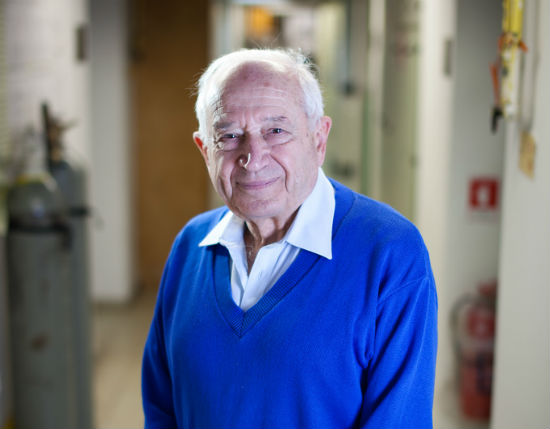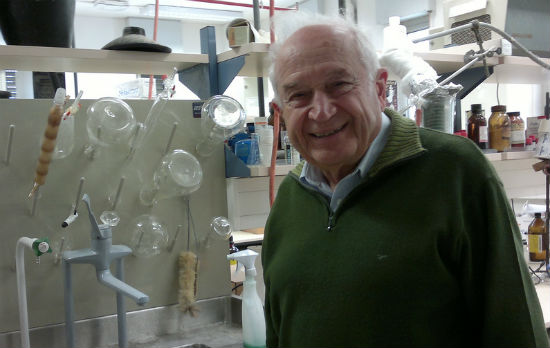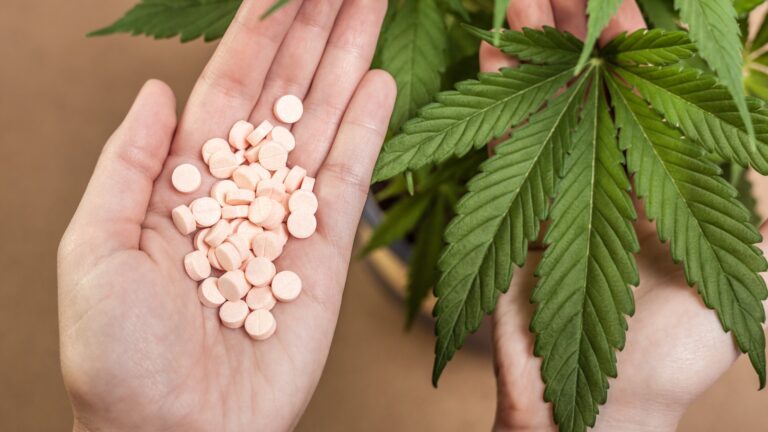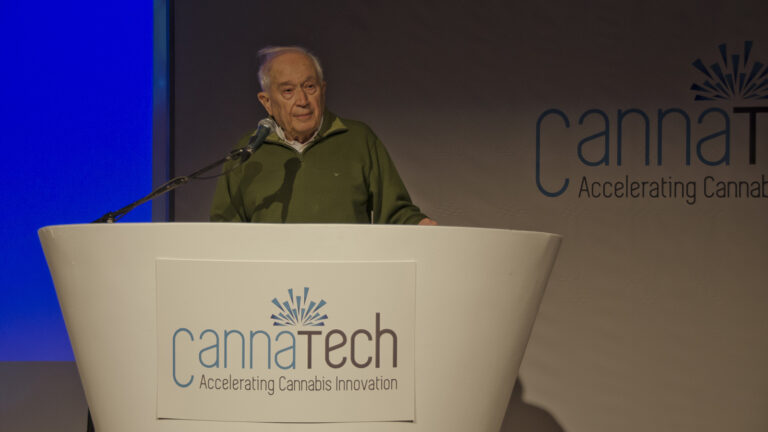If some 7,000 Israelis can fill a prescription for marijuana to ease pain and enhance appetite, it’s only because half a century ago, Hebrew University Prof. Raphael Mechoulam isolated and synthesized THC, the main psychoactive compound in the cannabis plant.
Speaking at his office in the Department for Medicinal Chemistry and Natural Products at the Hadassah-Hebrew University medical school, the octogenarian pharmacologist explains that scientists as far back as the 1800s realized the beneficial effects of pot but legal problems stifled serious study.
“The laws in many countries were such that people in academics didn’t want to work in this field,” the grandfather and still-active researcher tells ISRAEL21c. “Chemists couldn’t get cannabis and biologists had nothing to work with.” And funding was non-existent.

That’s why, 50 years ago, Mechoulam took a rather unconventional path to break the deadlock.
Then a junior faculty member at the Weizmann Institute of Science in Rehovot, the young researcher did not realize he could approach the Ministry of Health to get samples for research. Instead he connected with the head of the investigative branch of the national police, who was an army buddy of the Weizmann’s administrative director.
The top cop, also unaware of official protocol, provided five kilograms of seized Lebanese hashish to Mechoulam. (Hashish and marijuana both come from cannabis and contain the same 480 components but are processed differently.)
By 1963, Mechoulam and his research partners had revealed the structure of cannabidiol (CBD), a key ingredient in cannabis. By the following year they had isolated THC for the first time, established its structure and synthesized it.
Further years of collaborative research showed that THC is the key ingredient that activates specific receptors in the brain just as similar chemicals in the human body do. These compounds work with the receptors to protect against many symptoms and conditions, including the nausea caused by chemotherapy and the pain from degenerative muscular diseases.
Mechoulam — later a rector at the university — eventually got a gentle scolding for his procurement method, but now his activities are fully aboveboard.
“I have been obtaining hashish from the police for over 40 years, with Ministry of Health-signed documents, without any administrative problems,” he says, adding with a smile that most of the pharmacists at the Health Ministry are his former students.
“Working in a small country certainly has its positive aspects,” Mechoulam says. “It couldn’t have happened in the United States, because the laws were too strict. In Israel there’s a lot of shouting, but in the end you can make it.”
Brain chemistry and personality
Born in Sofia, Bulgaria, Mechoulam is one of the most recent recipients of the Rothschild Prize, a $50,000 award for outstanding researchers.
Based on the discoveries he led, the Israel Ministry of Health set up a program to provide approvals for certain patients to have access to medical cannabis
“I give THC to Hadassah free of charge, and a few physicians use it, for example for bone marrow transplant patients,” Mechoulam says.
He’s been at the Hebrew University for 45 years, and though he retired 15 years ago you’d never know it. In fact, a new lab is being constructed for his team.
“They are very generous here,” he explains. “You can stay on if you can get grant money, so I continue working on several topics, mostly in the field of medical agents.”
At 81, he is actively collaborating with scientists and students in Israel, the United States, Europe, Brazil, Japan and New Zealand to examine and synthesize a range of brain chemicals. Companies in Europe and Israel are eager to develop drugs based on this research.
“We have started looking at something nobody has yet really looked at thoroughly: The chemical basis for why eight billion people in the world have different personalities. The same compounds are found in all our brains; however, they all go up and down constantly.”
A treasure trove waiting to be discovered
Mechoulam has been married for 55 years to Dalia, a retired teacher. Their son Roy is a mathematics professor at the Technion-Israel Institute of Technology; daughter Hadas is a pediatric ophthalmologist and daughter Dafna is a pediatric neurologist. There are seven grandchildren ranging in age from two to 19.
“All of them live in Jerusalem,” he says. “We are very lucky; every Friday all of them come for dinner.”
Mechoulam is a World War II history buff. “I was a kid then, but it was something we followed day by day despite the fact that Jews were not allowed to have radios.”
His father was head of the Jewish hospital in Sofia and then became a village doctor when the family had to flee the Nazis. After they emigrated to Israel in 1949, Mechoulam had to wait a year to start learning chemistry because the Arab Legion controlled the area where Hebrew University’s labs were located. In the meantime, he researched insecticides as part of his army service.
“I found the independence of research to be an addiction from which I do not want to be cured,” Mechoulam says.
Much work remains to be done before medical marijuana can be available to people of all ages in quantified doses. “We don’t know exact amounts and how to use it, so we cannot give it to everybody,” he says, though further research could solve those mysteries.
“I believe that the cannabinoids represent a medicinal treasure trove which waits to be discovered,” says Mechoulam.


















